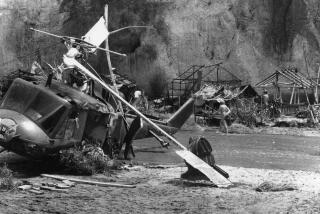An accident or a fraud? His campaign was still a wreck
- Share via
DOVER, N.H. — Something -- maybe a deer -- darts across the dark highway, a blur of motion obscured by swirling snow.
Gary B. Dodds, family man, businessman, congressional candidate, jerks the wheel. The car slides, then swerves off the road, over a guardrail and down a hill.
The air bags burst open. His head aches. Is that smoke he smells? Dodds doesn’t wait to find out.
Sometime after bolting from the car, he plunges into the 46-degree waters of the Bellamy River. Drags himself to shore. Plods up a hill, his legs like concrete. He collapses under a tree in the woods until late the next night, when he is startled by the flashlight of a volunteer rescue worker.
“Oh, thank God,” he says.
Extensive nerve damage to his feet keeps the candidate off the campaign trail for months. On his right foot, one toe is permanently bent; another is twisted. His pinkie toe points out at an odd angle. By the time he recovers, many voters already have made up their minds. Five months later, he loses the Democratic primary, finishing a distant third among four contenders.
On April 5, 2007 -- the one-year anniversary of the crash -- Dodds’ 14-year-old daughter gives a speech at church about why that day is special to her. She describes how thankful she is that her father survived his frightening ordeal.
When he gets home, Dodds is charged with making it all up.
Another possibility
There’s another scenario for what happened that night.
Gary Dodds, suspected of being an adulterer desperate to boost his pitiful campaign, crashes his car and gets picked up by an accomplice. He spends the night in hiding, soaking his feet in cold water to make it appear that he has been outdoors. The next day, he sneaks back to the scene of the crash and waits to be rescued.
“This whole thing does not make any sense,” Dodds says. “The logical person would look at this and say, ‘You’ve got to be kidding me.’ It’s absurd. It’s too bizarre.”
But those words could just as easily have come from the lips of the prosecutor, who charged him with causing a false public alarm, leaving the scene of a crash and falsifying evidence by altering the appearance of his feet.
Why were Dodds’ feet swollen and purple when he was rescued but the rest of his skin a healthy pink? Why were there footprints leading from the car back up to the highway, but -- by most accounts -- none leading into the woods? If Dodds had nearly drowned in the river, why were his clothes dry except for his shoes and socks?
And why would he cross the river in the first place, passing by homes on one side and a condominium complex on the other, never calling for help?
“You’d have to avoid human beings. You’re running into civilization left and right,” Strafford County Attorney Thomas Velardi told jurors at Dodds’ trial. “You’re not on a ledge on Mt. Washington. You ain’t in the Ozarks. You’re in a neighborhood in Dover, New Hampshire.”
The 15-day trial featured a cast of characters worthy of a murder mystery. The fired campaign manager. The politically ambitious neighbor. The alleged mistress who denied knowing anything. The wife who seemed to know just a little too much.
And the prosecutor’s theory? Straight out of the board game Clue: Mr. Dodds. In the campaign office. With a bucket.
Troopers at mansion
From its hilltop perch in Portsmouth, the 200-year-old Cutts Mansion once overlooked lush grounds complete with a bowling green and tennis courts. Today, it stands yards away from a busy highway and a gas station, most of its grandeur stripped away long before Dodds and his wife bought it eight years ago.
On the day after the crash, two state troopers headed to the mansion to check out Dodds’ second-floor campaign office and a first-floor apartment he rented to a young campaign staffer. When they knocked on the woman’s door, a man answered but would not let them in. When the woman staffer arrived home hours later and let the police in, the man had vanished.
Before the trial, prosecutors said Dodds was having an affair with the woman and hinted that he may have been hiding in the mansion after the crash. Dodds denies both claims, and the judge barred any mention of an affair. But testimony about a mysterious voice, coupled with the home’s history, added another layer of intrigue to the case.
According to two sisters who lived there in the late 1940s, the mansion was full of secret hiding places: rooms behind bookshelves and three underground tunnels that provided endless opportunities for spooky adventures. But a subsequent owner who performed extensive renovations says he never saw any tunnels, and a quick tour by this reporter revealed no obvious way out of the campaign staffer’s apartment.
Dodds has a ready explanation for the mystery voice, though it’s not one he offered during the trial. He says another tenant who lives upstairs may have heard police knocking on the door of the apartment below and called out. Any suggestion that he was at the mansion after the crash is “a bunch of hogwash,” he says.
Dodds has ready explanations for a lot of things, starting with his belief that investigators filed charges to cover up bungling the search. After an initial look at the crash scene and a walk through the woods later that night, authorities didn’t begin a coordinated search-and-rescue effort until the next morning.
“These people all have a vested interest in making sure the outcome is what they need,” Dodds said in a lengthy interview with the Associated Press. “I don’t have a problem with people making a mistake, but when you have to cover it up, and put the blame on somebody else to take the fall for it, that’s absolutely wrong, absolutely wrong.”
The state’s key witness -- a retired Army officer who spent decades studying cold-weather injuries and has trained military and medical personnel on the subject -- lacks credibility because he is a veterinarian, not a physician, Dodds says. He argues that a Portsmouth doctor who reached the same conclusion -- that Dodds suffered not from frostbite but from trench foot -- can’t be trusted because he’s also a firefighter and therefore would back up law-enforcement officers.
Dodds insists authorities were unduly influenced by his former campaign manager, Corey Corbin, whom he accuses of lying about the campaign’s finances, and by Caren Peloso, who pushed investigators to file charges after hearing the crash from her house and running outside to find Dodds’ empty car. Though she later ran for the state Legislature as a Republican, Peloso denied that politics colored her opinion of the congressional candidate.
“I had never heard of Mr. Dodds,” she said.
But why would Dodds create such an elaborate hoax?
It was a publicity stunt intended to attract sympathy and support for a failing campaign, the prosecutor contends. Dodds took out two mortgages without his wife’s knowledge and told police she wasn’t happy to learn just before the crash that he had donated $90,000 -- nearly twice what they had planned -- to his campaign.
“It would’ve been a great story,” Velardi said. “All the people who hadn’t heard of him before . . . really would’ve known who he was.”
Cindy Dodds, who testified that she knew about the mortgages, also came under suspicion that she was involved in the plot. While her husband was still missing, she brought up several elements of his story to police, including the possibility that he had swerved to miss a deer, hit his head and ended up in the river. Standing near the water, she told an officer that she was surprised that it was so far from the highway.
“Was it supposed to be closer?” Velardi argued before the jury. “Those are odd, interesting, coincidental statements.”
The trial
By Dodds’ count, jurors heard 91 hours of testimony and had 900 pages of documents to consider by the time the trial wrapped up last month. Subtract some time for lunch and breaks, and jurors spent about five hours deliberating his fate before returning their verdict.
Guilty. Guilty. Guilty.
Appearing on national television the day after the verdict, the 43-year-old ex-candidate had this message for the investigators: “May God have mercy on their souls.”
A day later, he was not so forgiving.
“God knows. And he will punish them,” he said. “It might not be on the Earth here, but it will be done.”
Dodds faces up to seven years in prison when he is sentenced March 31, though the prosecutor said he is most concerned with having Dodds repay the $20,000 the state spent searching for him.
He earlier rejected a plea bargain that would have allowed him to avoid jail time by paying the fine, apologizing and pleading guilty to leaving the scene.
“I’m not going to admit to something I didn’t do,” he said. “That’s not right.”
“I’ve been brutally attacked, and you know what? I’m still standing,” he said. “You can discredit me, you can talk about me, you can have people talk about me, but I know in my soul I know who I am, and the people who know me know who I am. And they don’t believe this, not for one minute.”
More to Read
Get the L.A. Times Politics newsletter
Deeply reported insights into legislation, politics and policy from Sacramento, Washington and beyond. In your inbox twice per week.
You may occasionally receive promotional content from the Los Angeles Times.










